It’s the end of my university semester and I have essays due really soon, which can only mean one thing: it’s time for another anime season roundup! Winter has been pretty strong for anime this year, with new and returning shows releasing to satisfy and disappoint every demographic imaginable. As an occupier of at least a few of those demos, I thought I’d do the boring thing and talk about some of my faves! It was surprisingly difficult to narrow the selection down to just seven, because I do want to do things with my life that aren’t waxing poetic about anime, so I’ll drop a few other recommendations here quickly that I didn’t have a lot to say about or I’ve talked about in the Fall 2020 post: 2.43: Seiin High School Boys Volleyball Team, Higurashi (New), Bottom-Tier Character Tomozaki, Jujutsu Kaisen, Cells at Work!!, and Cells at Work: BLACK. Alright, then without further ado, here come the hits!
The Quintessential Quintuplets 2
Bibury Animation Studios

I think one of the strangest and least attractive subgenres in anime is that of the harem. I know for a fact that the reputation surrounding harem anime was quite a strong argument to dissuade me from every touching this cursed medium. However, as my taste in entertainment has gotten more awful with the passage of time, I know find myself actively excited for a harem anime airing once a week. I have to know, because this thought haunts me daily: what the hell happened here?
So it turns out there’s a genuine art to constructing a compelling harem anime, which is a revelation that has shaken me to my anime-poisoned core. I realised fairly quickly that the more I watched of The Quintessential Quintuplets, the more I’d stop caring about the whole romance angle, because I would be too busy adoring the interconnected dynamics between the titular sisters. I’m glad to say this aspect of the show has carried over nicely into the second season, as the girls are thrown into more and more formative situations to better understand the kinds of people they want to be. The initial hook of protagonist Futaro working as a tutor for the quintuplets takes more and more of a backseat as time goes on, as focus is drawn closer to the various conflicts that arise between the characters.

Through the usual cavalcade of wacky anime circumstances, these girls are explored in a shocking level of depth wherein characters I initially couldn’t stand are now among my favourites. Even Futaro, whose protagonist status is usually reserved for a self-insert blank slate character, is kind of a conceited dick much of the time, causing him to recognise his faults and gradually learn how to be more thoughtful and kind to the people around him he cares about. It’s nice to see a show like this go the extra mile to treat its characters like real, complicated people and not simply a thinly-veiled excuse to ogle at boobs or whatever. On top of the excellent character writing, animation has seen a significant improvement across the board with a lot less noticeable cut corners. The visual comedy here is genuinely really strong and consistently gets laughs out of me.
For those reasons, I can comfortably recommend Quintessential Quintuplets to just about anyone. It lacks much of the usual annoying fan service bullshit you see in many other harem anime, generally avoiding clichéd conflicts and situations in favour of honest, character-driven developments that are actually believable. It only seems to be getting stronger as time goes on, and while I’m not fully sure if this is the final season, I can say with confidence that this show is a really good time all around.
Dr. Stone: Stone Wars
TMS Entertainment

Dr. Stone is a really weird show for me because it’s one that I have an absolute blast with every single week, often feeling in the moment like it’s among my favourites, but then it leaves exactly zero impression on me. I would sincerely struggle to recount the anime’s various story beats, not because it’s poorly made or even due to the many science terms thrown your way every episode, but just because it isn’t concerned with that really. Watching Dr. Stone is comparable in my mind to tuning in for a Saturday morning Pokémon episode; it’s quick, easy to digest, and you come away from it feeling good.
This is by no means a negative quality, of course, because Dr. Stone is so fucking fun to watch. I’m regularly in the mood for heavy shit that’ll ruin my day or infect my mind for weeks, but between those moments, it’s really nice to just tune out and watch the funny anime men do a science together and make goofy jokes. There’s just such an infectious warmth to this series that’s borderline impossible to dislike. Senku is a fantastic protagonist, as genius and ambitious as he is self-absorbed, yet behind that cool-guy veneer is a man who cares deeply about preserving human life, no matter what it takes.
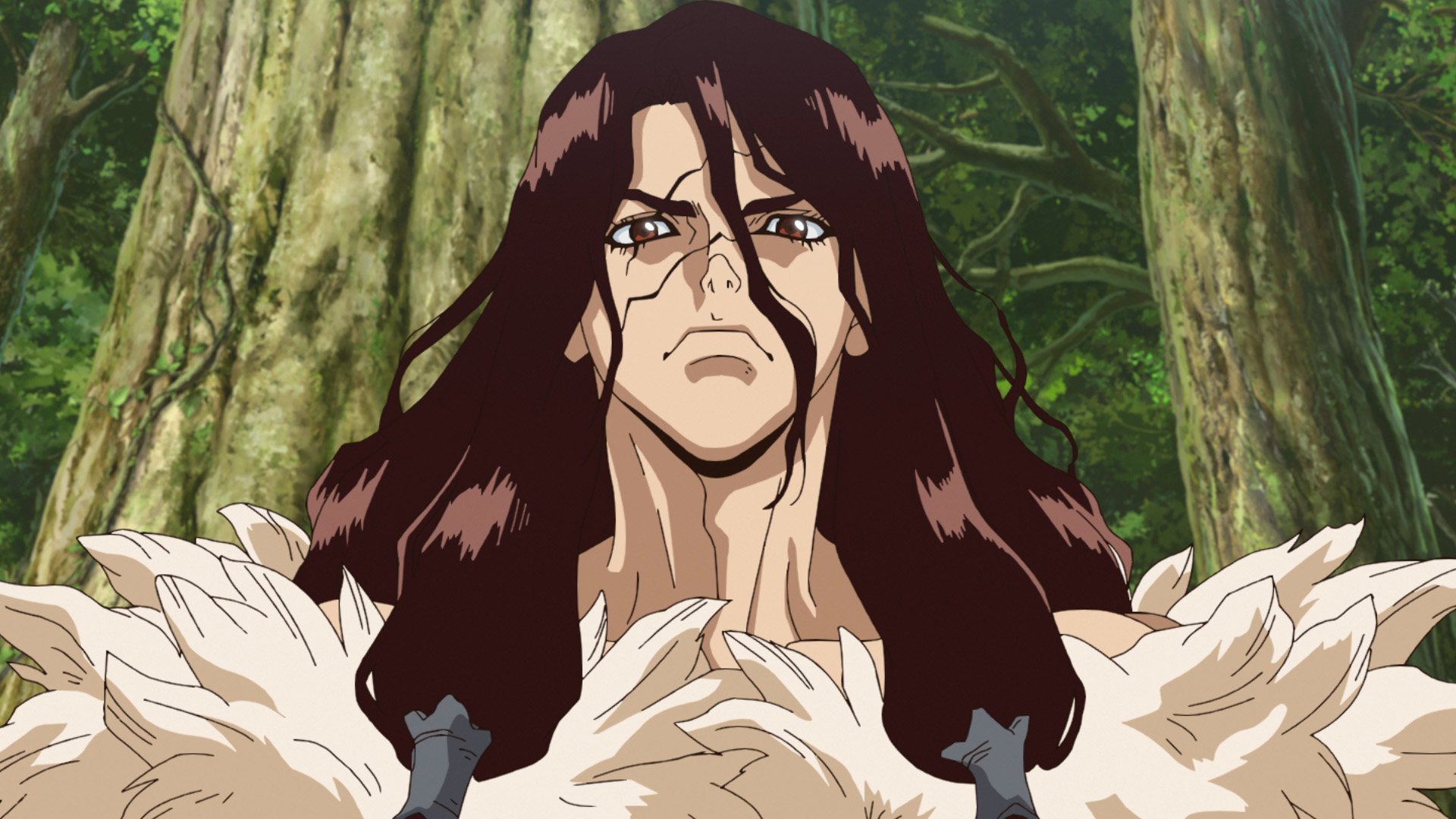
The main antagonist is really interesting too, in that while his actions are abhorrent and need to be stopped, he’s got this quietly intimidating aura to him, which makes the moments which showcase his insane fighting power pack a significant punch. Moreover, his vision of the new world is one that runs deliberately counter to the old one, focused on eliminating all the greed and self-absorption that plagued the 21st century. His plan does involve replacing that with a society led by its most physically strong members, making him some kind of stone age über-libertarian, so it’s pretty easy to take Senku’s side, even when the villain isn’t necessarily all wrong in his thinking.
What brings Dr. Stone down ultimately is the whole “animation” part of the anime. For the most part it’s pretty static, feeling almost like one of those stylish manga promotional videos rather than a fully fledged animated series. I get the impression that reading the manga would result in about the same experience but even so, that experience is an immensely entertaining one. I really like Dr. Stone and I get excited to return to it week after week, so on that basis I can recommend it. At the very least, check out the manga, since I can only assume it’s just as fun.
Horimiya
CloverWorks

What makes Horimiya amazing has very little to do with any kind of particular originality. Observed from a distance, it’s a pretty bog-standard romance setup where cute anime boy meets handsome anime girl under abnormal circumstances and their relationship blossoms from this shared understanding of one another. I wouldn’t be selling just how incredible this show is if I tried to explain it in that clinical, objective way, because it’s the various immaculately maintained cogs that propel this feels machine forward.
What makes mangaka HERO’s popular series so likeable is its unwavering commitment to honesty. Conflicts aren’t caused by goofy anime bullshit that can be resolved in a single sentence. Rather, character tension originates where it always ought to: from the characters. A tiny seed of doubt can blossom into a deeply-rooted insecurity that person then has to work through to move on with their life. Characters fall out over a frustrating inability to admit how they truly feel, since they fear ruining whatever relationship they’ve built.
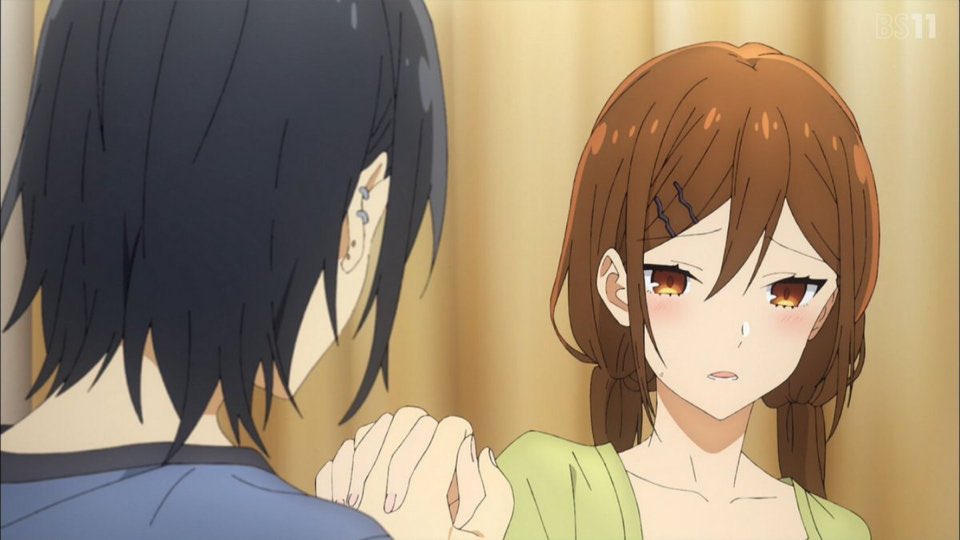
These people act like…well, people. They have complex internal struggles they struggle to properly articulate, and what always ends up helping is simply being honest with themselves and just talking about it with a friend. It sounds unbelievably simple, but by positioning former friendless loner Izumi Miyamura as a main character, any new developments uncovered from the huge cast of characters always feel organic, especially since every character is astonishingly distinct from one another so even when they’re put through quite similar trials and tribulations, watching them figure it out in the way that best suits them never fails to be engaging.
It’s also worth mentioning that while Horimiya has a tendency to wreck my shit with raw, unflinching sincerity, it’s also one of the funniest anime I’ve ever seen. Every single episode has a joke or ongoing bit that has me absolutely dying. The comedy here never feels mean-spirited or cheap; the show’s sense of humour just exudes this infectious warmth that can’t help but be endlessly charming and hilarious. The characters bounce off each other effortlessly, making the more serious moments that test their relationships that much more enthralling.

I realise that I don’t have a huge amount to say about Horimiya because it’s one of those shows that’s just self-evidently good. Just watching it proves the team behind it have an iron grip on the mechanics of a show like this, so I can recommend it on that alone. More than that though, it’s a show about being kind and understanding to one another. The truth is that we can never truly know one another, but rather than give up and accept defeat, this should be seen as an exciting reality, because it means we can keep learning about each other and, in turn, ourselves as well.
Re:Zero -Starting Life in Another World- Season 2 Part 2
White Fox

Continuing the sub-genre of “anime that represent deeply rooted personal issues with such an unflinching honesty that I have to lie down for a little while”, Re:Zero!
One thing media has a tendency to portray in both its heroes and villains is a sense of absolute conviction. What I mean by that is even if a character’s worldview and actions are completely and unambiguously wrong , their reasons for acting that way tend to fit their own twisted sense of logic. When Darth Vader asks Luke to join the Empire and the Dark Side, he does so with the understanding that the most powerful ought to rule the galaxy. Light Yagami’s use of the death note to murder innocent people for simply getting in his way doesn’t align with his general rule to only execute criminals, but his unshakeable belief that he is the only person who can lead the new world means their interference is a necessary sacrifice on the road to that supposed utopia. These characters are wrong and doing the things they do for the wrong reasons, but because their beliefs and actions make sense to them, the other characters, and thus the audience, generally have little trouble opposing them by presenting their own belief systems as a counter.
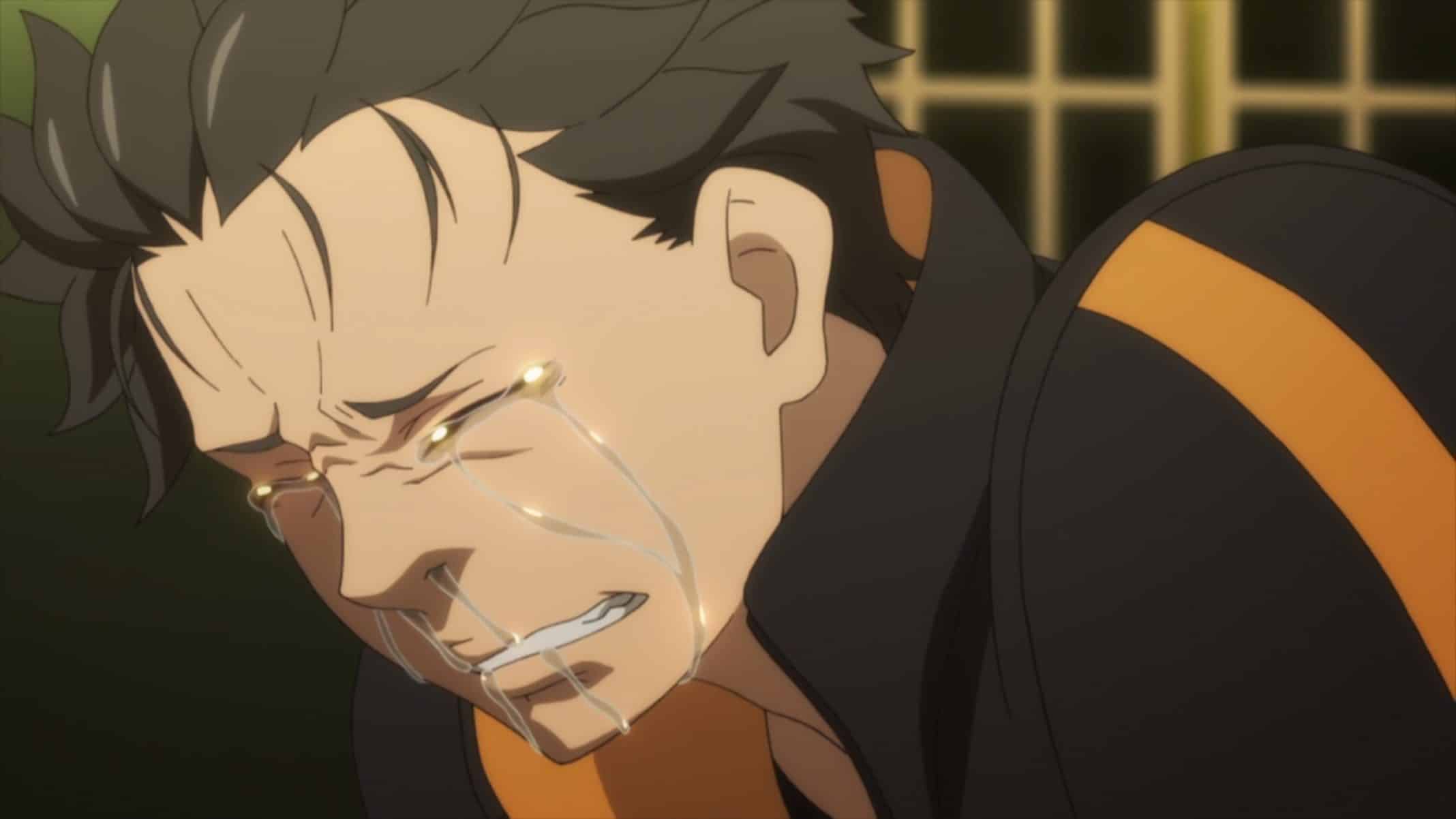
This is a very convoluted way to say “bad person do bad thing because they bad” but it bears illustrating because, quite frequently, Re:Zero actively refuses to satisfy those unspoken expectations. That doesn’t mean characters in this show just do shit because they feel like it. Rather, author Tappei Nagatsuki instead identifies that sometimes people can become so absorbed by their own trauma that they become completely irrational, their actions and beliefs no longer based in any kind of logic, even their own. I know that on my worst days, I believe things that don’t make sense or are absolutely untrue, but because I’m trapped in my own despair-ridden head that acting rationally becomes borderline impossible.
I’ve fallen into thoroughly unhelpful routines that shield me from anything that could hurt me, because any opportunity to look inward and fix the problem is absolutely terrifying. It’s not just that you’re wrong; you actively refuse to try being right, because that way you might get hurt. It’s an incredibly dangerous and damaging experience to go through and it’s one I still have to this day. It’s also one that Re:Zero portrays with an honesty I very rarely see in anything, let alone just anime.
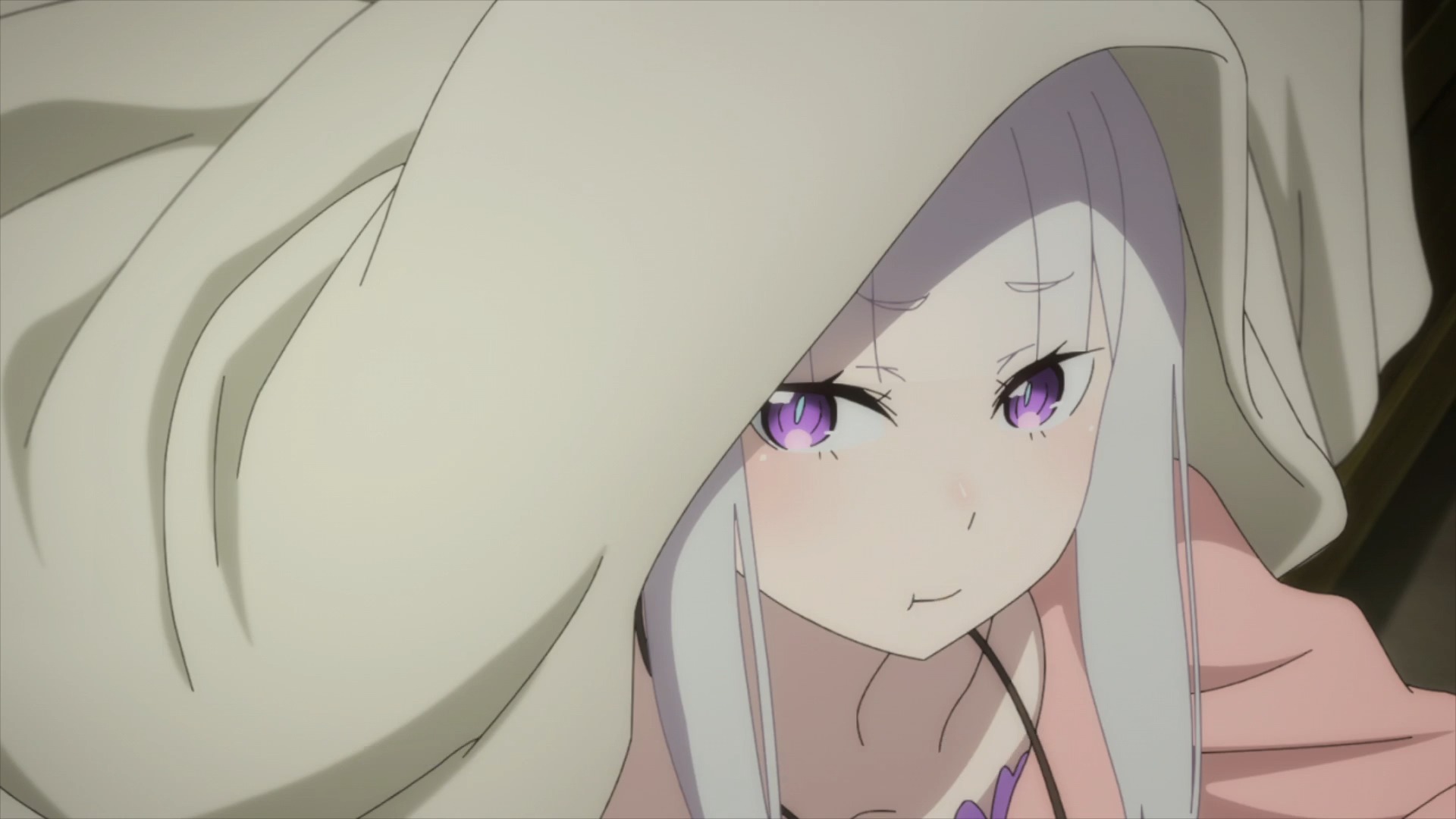
For a long while, this is a struggle depicted exclusively through the eyes of the show’s protagonist, Subaru. However, while he has come to terms with his own insecurities by this point in the story, the next step in his journey becomes using his own experiences to help the people around him experiencing that same inner torment. This season makes him almost a side character, reserving entire episodes for the rest of the cast and their own unique circumstances. Subaru has the power to return after death, but this narrative hook is more or less forgotten as the story becomes a glorified group therapy sessions with Subaru taking the lead and somehow the show’s most emotionally stable character. It’s so cathartic to see him take on this responsibility of his own accord, and seeing the people around him not simply surviving but even thriving is enough to bring me to tears almost every week.
I can’t get into specifics because spoilers but if any of that word vomit sounded interesting to you, I cannot recommend Re:Zero enough. It has gone far beyond its isekai-subversion roots and grown into this masterpiece of emotional storytelling that I sincerely hope everyone gets to experience at least once.
Attack on Titan: The Final Season
MAPPA

I’m going to be completely honest right now: for the longest time, I didn’t give a single shit about Attack on Titan. I watched all three seasons and enjoyed them fine enough, but out of what I can only assume was stubbornness, I didn’t engage with it at all. There’s a chance that at the time I was a bit too preoccupied being a really depressed student living in a house I resented and like five deadlines I knew I’d never meet However, since I’m coping a lot better now than I was, I decided to sit down and give the show an honest chance, divorced as possible from any preconceptions I might have had. I wanted to feel the way I did as a media-illiterate teenager watching *that scene* happen in episode 5 of the first season that left my heart pounding and my mind decidedly blown. I wanted to *get* Attack on Titan, and I’m overjoyed to announce that I finally do. Sorry, edgy contrarian 16-year-old me, I’ve become a fan of the popular thing.
In the interest of avoiding spoilers – in case you’re one of the three people in the multiverse who has evaded those – I won’t go into detail here on what makes the show so incredible. However, what sets this new season apart from the rest is the way in which it effortlessly recontextualised my entire understanding of Attack on Titan as a series. Up until now, as much as I loved my time with the first three seasons, I’ll admit that their thematic elements had a tendency to meander. It always felt as though the narrative was one step away from becoming a masterpiece but it was weirdly hesitant to play its full hand. I’m so glad I was wrong though, because once that twist hit at the end of the third season and mangaka Hajime Isayama revealed the true scope of the story, I was well and truly strapped in. This story handles discussions of war, guilt, freedom and forgiveness with a level of maturity and nuance rarely seen in anime, especially one as popular as this.

More than anything, Attack on Titan is a tale of hate, where it originates, why it happens, how it can be used by bad actors as a weapon, and the ways in which that strategy of vilifying the other gives rise to the most dangerous people in society. It’s not a show that wants you identify a hero and a villain, or right and wrong, because in real life, those things don’t really exist. It acknowledges how brief and seemingly insignificant an individual life really is in the grand scheme of the universe, but rather than dwell in despair over this, makes the case that because we are thinking, feeling creatures with our own complex understandings of the world, depriving others of life’s simple joys through our actions or inaction in some attempt to rise above our own mortality is the cruellest thing you can do.
It’s a kind of optimistic nihilism that can be difficult to come to terms with and god knows Attack on Titan aims to make you think about uncomfortable truths, but by reducing our own existences down to their base elements, you can come out the other side with a better understanding of yourself going forward. In a lot of ways, Attack on Titan is a cruel show, but every so often there are moments of overwhelming kindness that remind you life, however fleeting, is worth living to the fullest possible capacity.

Oh, and it’s also a show about cool anime guys and gals slicing up big guys with swords so if you’re into that, check it out as well!
SK8 the Infinity
Bones

I feel like I’ve been talking about a lot of heavy shit for a good while so let me divert your attention away to a *slightly* more wholesome show from the studio behind My Hero Academia: SK8 the Infinity! As someone who’s never been particularly into skateboarding, I can’t say I had much of an interest in this one outside of its stellar animation team, so I was stepping into it tentatively. After a couple episodes, I was digging the gorgeous animation and fun sense of humour. A couple episodes more and I’m beginning to pick up signs that the relationship between protagonists Reki and Langa might not simply be a friendship. Then a week later, the show’s main antagonist Adam proclaims Langa to be his “Eve” as he holds him in a dancing embrace. *Then* I find out the show’s director, Hiroko Utsumi, also lead the productions of Banana Fish and Free!, two shows whose connecting factor is either including gay characters or possessing the fabled gay vibes. “Oh”, I thought to myself, “this show is gay, isn’t it?”
In fairness, none of those aforementioned gay vibes the show undoubtedly possesses have resulted in any concrete gay relationships, but the theme of unrequited love appears to be prevalent across the board here. For some reason I struggle to fully explain without spoiling it, this show doesn’t feel like simple queerbaiting. Especially in recent episodes, characters expresses clear affection for others, but the difference is those feelings are yet to be reciprocated for anyone. At this point in time, the quality of the show is entirely dependant on how they choose to pay off all of this setup, so it remains to be seen if all this inherent gayness is intentional or simply queerbaiting operating on a horrifying new level.

I can safely assert, however, that the basic concept of love as a source of motivation is certainly at the heart of the show. Reki loves skateboarding but his inability to keep up with Langa’s talent shakes his resolve. Langa loves skating with Reki, so whenever Reki isn’t present, Langa’s motivation to try his best and excel bails completely. To these characters, skating isn’t simply a hobby they do for fun, because each of them has their own unique reason to love it so much. Skating is simply a framing device to explore the mechanics of human motivation, and how without a sufficient reason to keep trying at something, it becomes very easy to give up.
I really like this show, if you couldn’t tell. If it fails to end on a satisfying note my opinion might change, but there is potential here for this to become an absolute classic, as well as possibly being a shining example of LGBTQ+ representation done right. Here’s to hoping this one sticks the landing.
Wonder Egg Priority
CloverWorks

First and foremost, as amazing as this last show I’m gonna talk about has been thus far, I need to drop a content warning here because Wonder Egg Priority deals in some really heavy subjects, so if you’re sensitive to depictions or discussions on suicide, self-harm, depression, sexual assault and parental abandonment (if I’ve missed anything, please let me know). The show follows a group of middle-schoolers who are each dealing with the tragic loss of people close to them. However, a talking cicada offers them the opportunity of defeating evil beings in another world to provide safe passage for suicide victims to presumably the afterlife, and in exchange they can revive the people they lost.
It’s a strange premise for sure but, setting aside the supernatural aspects, at its core, Wonder Egg Priority is about coming to terms with the darker parts of life, and it does so by introducing its four likeable protagonists. Each character represents a different struggle of growing up as a teenager: Ai, the shut-in whose kind, energetic nature is hindered by her crippling fear of the outside world; Neiru, the child prodigy whose sheltered upbringing and the high expectations set upon her make it difficult for her to express herself sincerely; Rika, a former child idol wallowing in obscurity, left feeling utterly alone by an alcoholic mother and an absent father, resulting in her developing an abrasive, overbearing personality; and Momoe, who stands taller than anyone her age which leads to misunderstandings about her gender, which creates a deep insecurity within her about whether or not she is sufficiently female and therefore acceptable to society.
/cdn.vox-cdn.com/uploads/chorus_image/image/68904832/Ai_Wonder_Egg_Priority_Season_1_Episode_6_Punch_Drunk_Day_2.0.jpg)
These are all probably relatable issues to just about anyone regardless of age or gender, and Wonder Egg Priority isn’t afraid to delve into the darker side of these anxieties. Left to fester, these worries are absolutely capable of manifesting in some of the worst coping mechanisms, like social isolation, self-harm and even suicide. These characters are each at different stages of this process for different reasons, which makes understanding how things can get that bad much easier, especially if you haven’t personally dealt with these issues before.
Aside from the heaps of thematic content to dissect in this show which, to be honest, I could do all day, on a base level, it does everything a great anime ought to do extremely well. Visually, Wonder Egg Priority is striking, boasting vibrant colours and a pretty unique aesthetic reminiscent of works from Kyoto Animation or Masaaki Yuasa. The animation is equally stunning. Naturally, action sequences are consistently enthralling, but its the quieter moments where characters express simple gestures, like Ai brushing damp hair from her face after a moment of great pride, or her friend squeezing her foot in a moment of vulnerability. The camera often likes to linger on characters during emotionally challenging situations without cutting away, evoking that same trapped feeling they’re likely experiencing at that moment. It’s a show with a huge heart, but it expresses that heart only after it forces the viewer to endure its characters’ hardships. It’s tough to watch at times, but the payoff is always worth it, and every one of the steps in this process is handled with a confidence and craft very few shows can accurately boast.
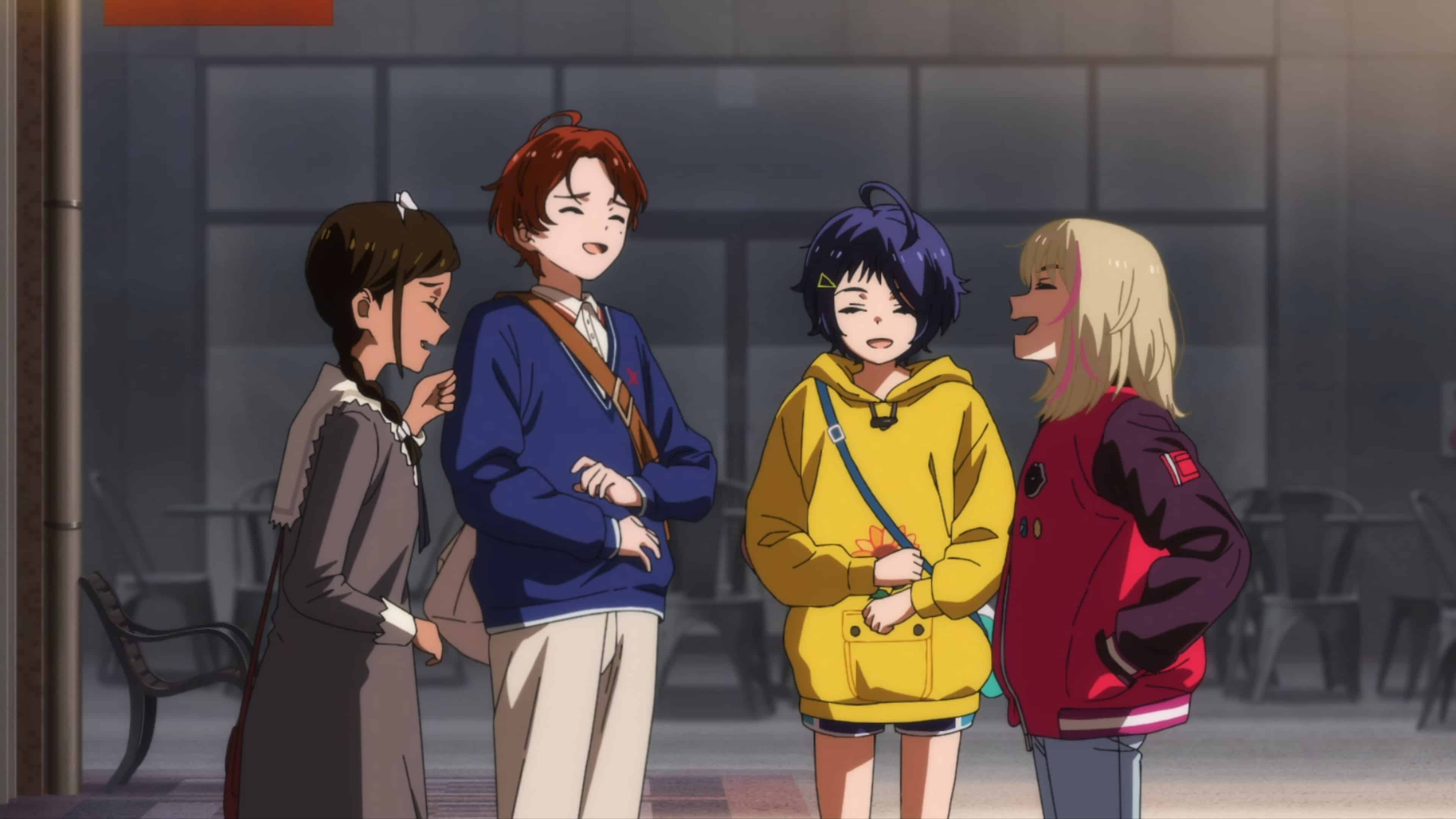
I hope I haven’t scared anyone off with all the talk about how uncompromising this show can be at times. It can be nice to return to a show every week and feel safe knowing what you’re going to get, but it’s also valuable to indulge in stories that make us feel a little uncomfortable, I think. Wonder Egg Priority is an example of that kind of show, but despite its sensitive subject matter it never once feels exploitative, which is a lot more than I can say for some anime. There’s a level of maturity on display here that makes it essential viewing in my eyes. If anything I’ve said sounds compelling to you, then please give it a try, because I’m confident you won’t be disappointed.
That’s it! That’s your quarterly anime fill, and you can leave now. Thanks for reading if you got this far, I love you very much. Have a lovely night ❤
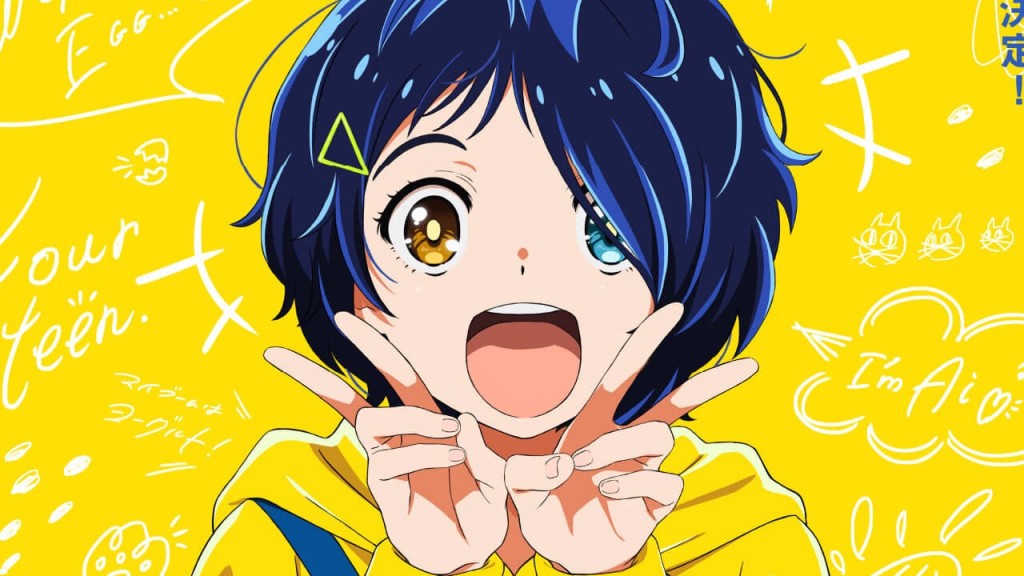
Leave a comment